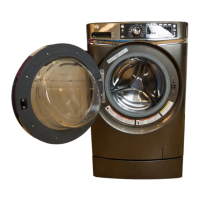25
Before you call for service… GEAppliances.com
Below is a list of truths and myths to help you better understand your frontload washer
Truth or Myth? Answer Explanation
There is not enough water
to properly wash my clothes
MYTH
6LQFHIURQWORDGZDVKHUVGRQRWUHTXLUHWKHWXEWR¿OOZLWKZDWHUOLNHWRSORDG
ZDVKHUVVLJQL¿FDQWO\OHVVZDWHULVUHTXLUHGWRWKRURXJKO\ZDVKDQGULQVHHDFK
load. Except for certain cycles like Handwash and Basket Clean that use more
water, you will not see a visible water line on the door glass.
My frontload washer may
add time or run longer than
the original displayed time.
TRUE
Occasionally, the washer may need to add more time to the cycle. This is mainly
due to automatic load redistributions to better balance the load and reduce
vibration. It is normal operation for the washer to add time to the cycle to
rebalance the load. Common causes of out-of-balance loads or longer cycle
WLPHVDUHDFORJJHGSXPS¿OWHUVHHWKHCare and Cleaning section), un-level
washer, or exceeding the recommended maximum load sizes.
I should see suds/foam
during a wash cycle in the
frontload washer.
MYTH
HE detergents, which should be the only detergents used in your
GE frontload washer, have been formulated to clean effectively
without causing a build-up of suds. If you add detergent until a
visible suds/foam level is reached, you may be using too much
detergent and negatively impacting washer performance.
Remember, more suds/foam does not equal more cleaning
power. Follow the manufacturer's directions for HE detergent.
It is best to wash full loads
and like fabrics together.
TRUE
Wash multiple similar garments at one time for best results. Washing single
items can cause an out-of-balance condition.
I need to keep the washer
level for proper operation
and to reduce vibration.
TRUE
,IWKHZDVKHULVXQHYHQDGMXVWWKHOHYHOLQJOHJVVRWKDWWKH\DUH¿UPO\WRXFKLQJ
WKHÀRRUDQGWKHORFNQXWVDUHVHFXUHO\WLJKWHQHG7KLVLVHVSHFLDOO\LPSRUWDQW
if the washer is installed on a pedestal. Leveling the legs on the washer or the
pedestal require the same steps.
It is impossible to overload
a frontload washer.
MYTH
Although the capacity of the frontload washer allows for larger loads than a
traditional topload washer, care must be taken to not overload the wash basket.
See the Loading and Using the Washer section for recommended maximum
load sizes. Overloading the washer can lead to reduced wash performance and
clothes becoming trapped between the door glass and the gasket, possibly
causing damage to your gasket or your clothes.
If not periodically cleaned,
my wash basket and gasket
may not maintain a fresh
smell.
TRUE
This is true for all washers, not just frontload. Regularly run a Basket Clean cycle
and clean around the rubber door gasket. When not in use, you may leave the
door slightly open for the inside of the washer to air dry. Close supervision is
necessary if this appliance is used by or near children.
Frontload washers have a
´SXPS¿OWHUµWKDWQHHGVWR
be cleaned periodically.
TRUE
Due to the nature of the frontload washer, it is sometimes possible for small
DUWLFOHVWRSDVVWRWKHGUDLQSXPS7KHZDVKHUKDVD¿OWHUWRFDSWXUHORVWLWHPV
so they do not damage the drain pump. To retrieve lost items, clean out the
SXPS¿OWHUVHHWKHCare and Cleaning section). Indicators of a clogged pump
are long drain and cycle times, wet clothes at the end of a cycle, incomplete
cycles or washer pausing in the middle of a cycle.
I cannot add items to a
wash cycle once it has
started.
MYTH
To add items after the washer has started, press Start/Pause and wait until the
GRRULVXQORFNHG7KHGUDLQSXPSPD\UXQEULHÀ\EHIRUHGRRULVXQORFNHG'R
not try to force open the door when it is locked. After the door unlocks, open
gently. Add items, close the door and press Start/Pause to restart.
Items left in pockets can
cause damage to the
rubber door gasket
TRUE
This is true for all frontload washers. Remove all loose items from your clothes.
Truth or myth?

